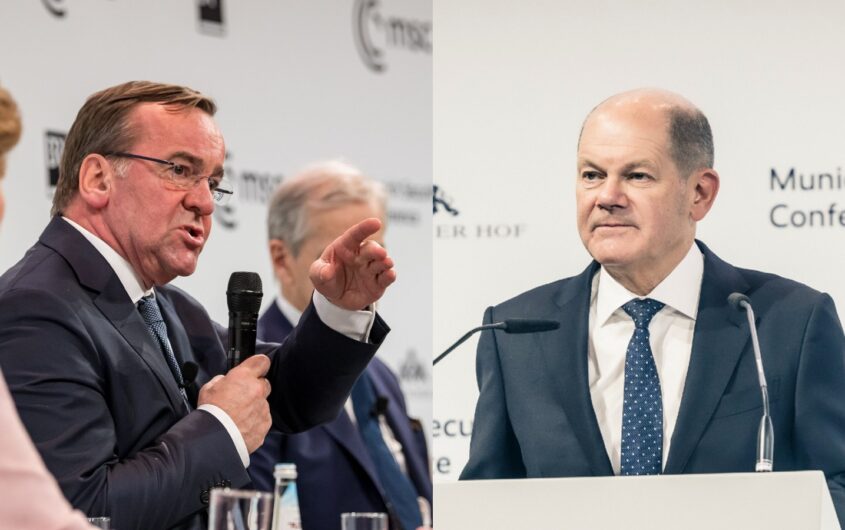
Photos via MSC/Görlich and MSC/Kuhlmann
Balancing Act

Joseph Vitale
AICGS/Halle Foundation Intern
Joseph Vitale is a research intern at AICGS for the spring of 2023. He assists resident fellows with their research projects, manages databases, and helps organize and document events.
Mr. Vitale is currently pursuing a master’s degree in German and European Studies at Georgetown University’s Walsh School of Foreign Service. He is concentrating his studies on issues related to transatlantic security and defense and is focusing his capstone project on Germany’s role in European security.
Mr. Vitale completed his undergraduate degree at Binghamton University in New York with a double major in history and German studies. He has also previously studied at both the Hertie School of Governance and Freie Universität in Berlin.
What Scholz and Pistorius’ rhetoric tells us about the future of the Zeitenwende
Much has changed in Germany over the past year as Berlin has embarked on a journey to fundamentally reorient its foreign and security policy, invest more money in the military, and play an active role in supporting Ukraine. Still, many of the promises from Scholz’s February 2022 Zeitenwende speech remain unfulfilled, leaving allies to wonder whether Germany would reach these goals in the future. Scholz has come under criticism at home for alleged vagueness and delayed decision-making while his government seemed out of touch with the realities of such change, particularly former Minister of Defense Christine Lambrecht. Boris Pistorius assumed the position following her resignation in January and has immediately brought a strong dynamic to Scholz’s government. Most recently, Scholz and Pistorius detailed Germany’s approach at the Munich Security Conference, addressing the state of the Zeitenwende and Berlin’s plans for the future. While Scholz’s remarks were leavened with his characteristic caution, his speech was tougher than others prior, and Pistorius spoke with a directness that marks a drastic change of tone from that of his predecessor. The difference in language and tone between Scholz and Pistorius offers a new glimpse of the future political management of the Zeitenwende, one year later.
Scholz’s February 17th speech at the Bayerischer Hof Hotel was one of his toughest in recent months, though he still displayed some restraint. Scholz is often more suggestive than definitive. He acknowledged Germany’s track record of support for Ukraine, but also justified his actions in a constant search for equilibrium. For instance, he stated, “I understand if some people here in Germany are concerned and question our decisions. I want to say to them that it’s not our arms supplies which are prolonging the war. The opposite is true.” Scholz highlights the balancing act between government policy and public opinion; this partly reflects his tendency towards vagueness, but it also represents a deeper political need for the head of government in managing a delicate challenge—shifting German policy dramatically while bringing the public along.
Scholz went to greater lengths to affirm German support without making promises for the future. He emphasized Germany’s alliance obligations with weapons shipments “not only meets the—it has to be said, justified—expectations of our partners and Allies.” He said that future assistance will be decided based on their sustainability:
“To date, any decision we’ve made on supplying new weapons systems has been taken on that premise: in the case of howitzers and multiple launch rocket systems, in the case of air defense weapons, armored infantry fighting vehicles, Patriot missile batteries and, most recently, Western battle tanks. And we will continue to decide on that basis in future.”
The emphasis on alliance commitments and sustainability leaves unclear how Scholz conceives of the future of German defense assistance. Considering the existing weaknesses of the Bundeswehr and drastically reduced weapons and ammunition stocks, such language implies that Germany may shy from taking a leading role in future shipment debates, such as those over fighter jets. Germany’s participation in the EU initiative to jointly procure and deliver ammunition for Ukraine could help provide the sustainability that is important for Scholz’s approach, though early signs are not entirely convincing of the bloc’s ability to fulfill its promises—still, the involvement of the EU in defense assistance could be an important development for Berlin’s long-term approach.
Scholz has stated previously that providing fighter jets to Ukraine was out of the question for Germany, and he made no mention of them in his MSC speech. Pistorius did not mention them in Munich either but also expressed concerns over Germany’s ability to provide them in an interview with the Washington Post a week earlier. Pistorius stated that jets have a “completely different starting position,” and that Ukraine would likely “come down to one model, and that’s probably one we don’t have.”
Still, Scholz spent much of the speech calling for strengthening both German and European security, often describing such actions as a necessity, and promising that Germany “will indeed fulfill [its] responsibility [to its allies].” Indeed, in one of the most cited parts of his speech, Scholz subtly pointed out that while allies were quick to criticize Germany for not sending tanks, many of the countries who had pushed them to do so had not themselves published plans to supply their own.
The real change in the dynamics of the security policy discussion has come from Pistorius, who played the metaphorical role of the muscle while Scholz addressed the need for balance with political considerations.
While Pistorius has garnered praise for his directness, his role will remain constrained unless supported with direct policy action from Scholz and budgets that survive the scrutiny of FDP Finance Minister Christian Lindner.
When discussing meeting NATO goals, Pistorius has taken a more forward-leaning position than Scholz. Scholz stated that Germany “will increase defense expenditure to two percent of gross domestic product on a permanent basis,” but did not offer a timeline. In his original Zeitenwende speech, he promised to reach the target in 2022, yet it now appears that even 2025 would be an optimistic estimate. Recent reports indicate that Berlin is planning to enshrine the two percent spending goal in writing in the national security strategy, a move which would place pressure on Scholz to reach his spending goals, but the details regarding a target date remain unclear. Pistorius also did not offer a definitive target date but has repeatedly expressed his frustrations with budgetary constraints. At the MSC, he affirmed that Germany is “strongly committed to the two-percent pledge,” stating that meeting the target is “overdue” and an issue “very important” to him. He has also claimed that he considers the two-percent target merely a “starting point” and that Germany needs to “spend more in the medium term.” In Berlin, Pistorius has already been pushing Scholz and Finance Minister Christian Linder to raise Germany’s defense budget by 20 percent—from its current €50.1 billion to €60 billion next year.
Defense procurement has been a major priority for Pistorius since his appointment, in stark contrast to his predecessor. In one of her final blunders preceding her resignation, Lambrecht came under fire for failing to acquire ammunition reserves for the Bundeswehr at a time when the military was projected to only have enough stock for a “few hours of combat” in the event of an outbreak of war. Pistorius has lamented the dire state of the Bundeswehr and has indicated that he believes the €100 billion special fund will not be enough. Pistorius’ position echoes that of the Bundestag’s Armed Forces Commissioner Eva Högl, whose recent report shows that despite new spending commitments, the German military is in a worse state than it was a year prior.
While Scholz veered away from making concrete commitments to defense procurement in his Munich speech, the presence of Pistorius has shifted the tone of his government. While Lambrecht had repeatedly come under criticism from coalition partners, Pistorius has received praise. For example, Alexander Müller of the FPD called him as a “politician who makes clear announcements, who doesn’t utter nonsense sentences, who also answers questions and doesn’t beat around the bush.” He has also risen (at least for now) to the top of the popularity scale in public opinion.
Still, the presence of a strong-willed defense minister alone is not enough to fulfill the promises of the Zeitenwende. While Pistorius has garnered praise for his directness, his role will remain constrained unless supported with direct policy action from Scholz and budgets that survive the scrutiny of FDP Finance Minister Christian Lindner. As opposition leader Friedrich Merz describes, “the impression remains that the chancellor hesitates, procrastinates and only ever makes decisions when pressured to do so.” But the arrival of new ambitions and an outspoken defense minister has generated new momentum inside the government, with internal pressure to raise Germany’s sights now a defining feature of the debate.
The early days following the defense reshuffle offer a glimpse of Germany’s direction. The chancellor has with Pistorius a new balance that can aid the development of policy options to fulfill the promises of the Zeitenwende on a timeline better attuned to the crucial threats to European security.








